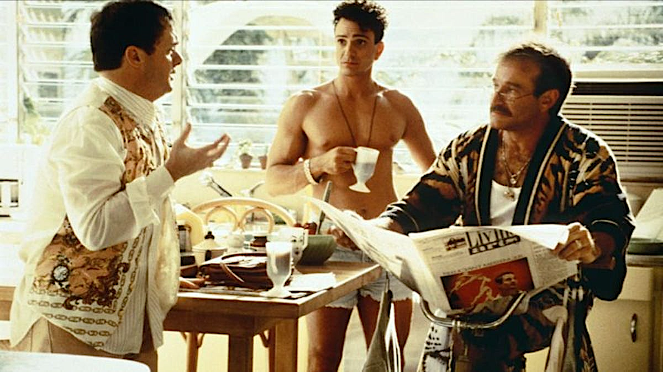Agador Spartacus Insists on Being Called by his Full Name
The Birdcage
1996 Director: Mike Nichols
Starring: Robin Williams, Nathan Lane, Gene Hackman, Hank Azaria
Hank Azaria plays one of his funniest (and most fun roles) as Agador Spartacus in “The Birdcage,” opposite Williams and Lane. He became famous for lending his voice to the animated TV series, “The Simpsons,” for which he received many accolades. He has played in many films and television shows, and received a Screen Actors Guild Award for “Birdcage.”
“The Birdcage” is an American remake of the French film, “La cage au folles” (1978). In both movies, a gay couple’s straight son wishes to marry an ultra-conservative politician’s daughter. Both are delightful comedies that describe the difficulties of pretending to be someone one isn’t in order to please another. In “Birdcage” Armand and Albert Goldman (Williams and Lane) live above and operate a drag nightclub in South Beach, Florida. Their son, Val (Dan Futterman), comes home from college and announces his engagement. The couple eventually comes to terms with the engagement, until Val wants them to meet his fiancé’s parents (Hackman and Dianne Wiest; their daughter is played by Calista Flockhart). Val also wants them to pretend they are straight to avoid problems.
In “Birdcage,” Armand and Albert are successful enough to have a live-in housekeeper in Agador, although he’s more like a family member that a servant. Agador is perhaps the most flamboyant character in the film. He is of Guatemalan descent and wants to be a part of the couple’s drag show. So he frequently dons outlandish outfits and sings and dances as he does his chores. At one point, he cleans the pool in a thong. While mopping the kitchen one day, he dances to Gloria Estefan’s “Conga,” and wears cutoff shorts, a pink bra, a redhaired wig, a necktie, and a large flower on his left shoulder. When Armand wonders what he’s doing, Agador tells him he is a combination of Lucy and Ricky. In essence, he is auditioning for the show, but in reality, Agador’s drag performance gains a much wider audience with film viewers than he ever would have had in the nightclub.
Agador, like Armand and Albert, must tone down his customary outfits and mannerisms when Val’s guests arrive. It’s hard to be someone one isn’t, but they all try to keep up appearances for Val’s sake. As in “La cage,”Agador becomes the family’s butler, but refuses to wear shoes because “they make me fall down.” His ill-fitting jacket and trousers and bare feet reveal how miscast he is as such a servant. But he tries anyway. With the visitors he adopts a deep voice, makes grand gestures, and even bows towards them in deference. Agador charms us because he defies our expectation of what a butler must be as he tries to fit the cliché, and in doing so, he makes us question the generalizations we hold as truths.
In essence, the whole point of “The Birdcage” is to confront and challenge stereotypes. When it was filmed, its message about a gay couple who just want to be themselves was groundbreaking. The movie pokes fun at its own era, when dire statistics about the AIDS epidemic were constantly in the news and the nation was deeply divided politically over gay rights. Its characters are charming, believable, and endearing. “Victor/Victoria” (1983), which appeared over a decade before “Birdcage,” also depicts gay protagonists that mainstream audiences could care about. But “Victor” takes place in 1930s Paris, safely removed in time and place from contemporary U.S. culture wars.
But let’s return to Azaria’s Agador, who steals all scenes he’s in, in spite of playing against heavyweights such as Williams and Lane. He often provides comic relief that breaks the tension when everyone is upset and, at times, he’s even more over-the-top than both of these great actors, with his lines, costumes, and mannerisms. When he opens the door as the guests arrive, he changes his name and introduces himself, “I am Spartacus, the Goldmans’ butler.” I believe that his sudden shift to an alias is significant here: it is more than comedic subterfuge. The first half of that line, of course, comes directly from “Spartacus” (1960; Stanley Kubrick, director), a story of a legendary military leader, who led a slave rebellion against the ancient Roman Republic. Spartacus fought for freedom against slavery and, in a sense, “The Birdcage,” did something similar. It sought freedom for people to be themselves.


